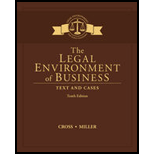
Case summary: Company DVRC was involved in developing a resort for skiing near the Park city. It sold land parcels to the third party in the resort village. Each sales contract done by the company kept the right of approval to conduct certain businesses on the possessions including ski rentals. For about 15 years Company DVRC granted permission to company CS to rent skies in competitions with the ski rental outlet of DVRC. DVRC opened a new mid-mountain ski rental outlet and rescinded the permission to rent skis of the company CS. CS filed a suit in federal district court against DVRC.
To find: The actions of DVRC was an attempt to create
Trending nowThis is a popular solution!

Chapter 27 Solutions
Lms Integrated Mindtap Business Law, 1 Term (6 Months) Printed Access Card Cross/miller’s The Legal Environment Of Business: Text And Cases, 10th
 BUSN 11 Introduction to Business Student EditionBusinessISBN:9781337407137Author:KellyPublisher:Cengage Learning
BUSN 11 Introduction to Business Student EditionBusinessISBN:9781337407137Author:KellyPublisher:Cengage Learning Essentials of Business Communication (MindTap Cou...BusinessISBN:9781337386494Author:Mary Ellen Guffey, Dana LoewyPublisher:Cengage Learning
Essentials of Business Communication (MindTap Cou...BusinessISBN:9781337386494Author:Mary Ellen Guffey, Dana LoewyPublisher:Cengage Learning Accounting Information Systems (14th Edition)BusinessISBN:9780134474021Author:Marshall B. Romney, Paul J. SteinbartPublisher:PEARSON
Accounting Information Systems (14th Edition)BusinessISBN:9780134474021Author:Marshall B. Romney, Paul J. SteinbartPublisher:PEARSON
 International Business: Competing in the Global M...BusinessISBN:9781259929441Author:Charles W. L. Hill Dr, G. Tomas M. HultPublisher:McGraw-Hill Education
International Business: Competing in the Global M...BusinessISBN:9781259929441Author:Charles W. L. Hill Dr, G. Tomas M. HultPublisher:McGraw-Hill Education





